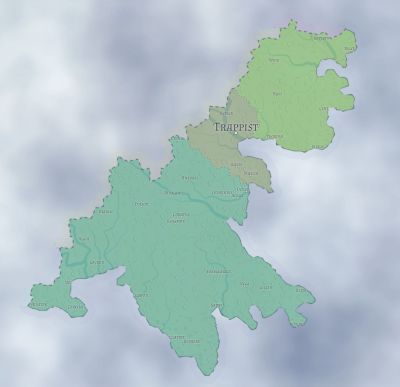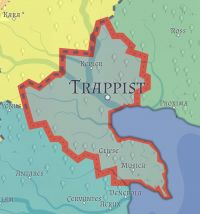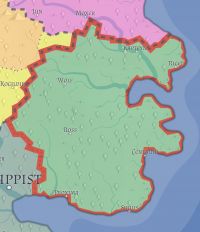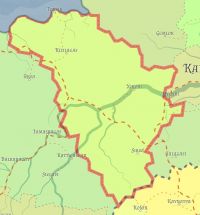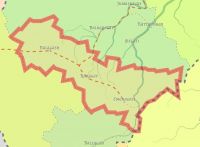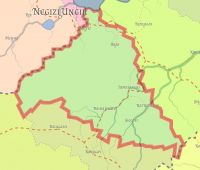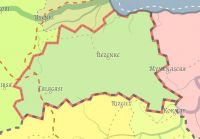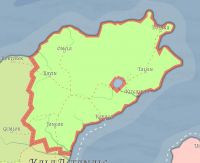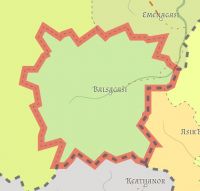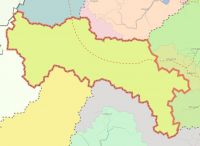Difference between revisions of "Garis Triumvirate"
| Line 65: | Line 65: | ||
<br style="clear: both;"> | <br style="clear: both;"> | ||
| − | ==== | + | ====[[Beybitsilik Region]]==== |
| − | [[File: | + | [[File:BeybitsilikRegion.jpg|thumb|200px|link=Beybitsilik Region|[[Beybitsilik Region]]]] |
{| style="text-align: center; float:right; margin-left: 10px; padding: 10px; border-style: solid;" | {| style="text-align: center; float:right; margin-left: 10px; padding: 10px; border-style: solid;" | ||
| − | |+ | + | |+ Beybitsilik Region Statistics |
| − | ! Land mass (sq. mi.) | + | ! Land mass (sq. mi.) |
| − | | | + | | 17,672 |
| − | |- | + | |- |
| − | ! Rural population | + | ! Rural population |
| − | | | + | | 998,427 |
| − | |- | + | |- |
| − | ! Urban population | + | ! Urban population |
| − | | | + | | 98,897 |
| − | |- | + | |- |
| − | ! Total population | + | ! Total population |
| − | | | + | | 1,097,324 |
| − | |} | + | |} |
| − | + | [[Beybitsilik Region]] is a territory of 1,097,324 souls in the country of [[Garis]]. [[Beybitsilik Region]] is administered from the regional capital of [[Kapteyn]] by the Secretary General [[Asylkhan Kuandyk]]. | |
| − | * [[ | + | |
| − | * [[ | + | The major settlements are as follows: |
| + | * [[Kapteyn]] - (pop. 20,253) - Capitol | ||
| + | * [[Sirius]] - (pop. 18,164) | ||
| + | * [[Wolf]] - (pop. 15,250) | ||
| + | * [[Proxima]] - (pop. 14,703) | ||
| + | * [[Centauri]] - (pop. 11,671) | ||
| + | * [[Rigel]] - (pop. 9,507) | ||
| + | * [[Ross]] - (pop. 9,349) | ||
<br style="clear: both";> | <br style="clear: both";> | ||
Revision as of 07:00, 18 May 2021
| Part of | Otan |
|---|---|
| Capitol | Trappist |
| Head of State | |
| Government | Triumvirate |
| Location | Southeastern Otan |
| Land Area | 76,000 square miles |
| Population | 4,600,000 |
| Racial Mix | 100% Garis |
The Garis Triumvirate is one of the more densely populated countries in Otan, with 4.6 million Garis inhabitants in and area measuring 76,000 square miles. The population of Garis is divided into three regions which are as much ethnically divided as they are politically.
The southern region, called the Ustemdik Region is host to three million Garis of the Ustemdik variety. These lupine featured citizens are invariably hawks in national politics and are almost always in a state of war readiness. The northern region, Beybitsilik Region is made up of the hyena featured Beybitsilik variant, who are at their core a peace-loving people. The third and smallest region is the administrative Akimsilik Region. The vulpine Akimsiliks administer the country's wealth and provide a means of centralizing the Garis Triumvirate government.
Population
The Garis Triumvirate is made up of 4,600,000 Garis souls with very few non-Garis calling the country their home. While Half-Garis exist, they tend to find life in Garis tedious and will often travel west where more mixed race people tend to live. Meanwhile in the Garis Triumvirate, the population is divided into three variants:
- Ustemdik (lupine) variant - 3 million
- Beybitsilik (hyena) variant - 1 million
- Akimsilik (vulpine) variant - 600,000
Geography
The Garis Triumvirate is a smaller country bordering the Aydahar Confederation to the north, Sigis to the northeast and Ontustik to the west. It's southern and eastern borders are coastal.
Within the country, the landscape is made up nearly entirely of deciduous forest, carved by many rivers and dotted with the occasional marsh areas. The capitol of Trappist sits on the Trappist River very near the coast. The deep river makes it a natural inland port, though trade with the Garis Triumvirate is somewhere between limited and non-existant.
Garis Triumvirate Regions
The Garis Triumvirate is made up of 3 distinct regions, each under the control and supervision of an administratively selected leader.
Akimsilik Region
| Land mass (sq. mi.) | 7,244 |
|---|---|
| Rural population | 462,068 |
| Urban population | 53,538 |
| Total population | 515,606 |
Akimsilik Region is the capitol region or the Garis Triumvirate, with 515,606 souls within, mostly of the Akimsilik variety of Garis. The Akimsilik Region is administered from the provincial capital Trappist by the Inspector General Aizat Kamalbek.
The major settlements are as follows: Akimsilik Region is a region of 515,606 souls in the country of Garis.
- Trappist - (pop. 29,848) - Capitol
- Kepler - (pop. 11,082)
- Gliese - (pop. 10,925)
- Musica - (pop. 1,683)
Beybitsilik Region
| Land mass (sq. mi.) | 17,672 |
|---|---|
| Rural population | 998,427 |
| Urban population | 98,897 |
| Total population | 1,097,324 |
Beybitsilik Region is a territory of 1,097,324 souls in the country of Garis. Beybitsilik Region is administered from the regional capital of Kapteyn by the Secretary General Asylkhan Kuandyk.
The major settlements are as follows:
- Kapteyn - (pop. 20,253) - Capitol
- Sirius - (pop. 18,164)
- Wolf - (pop. 15,250)
- Proxima - (pop. 14,703)
- Centauri - (pop. 11,671)
- Rigel - (pop. 9,507)
- Ross - (pop. 9,349)
Kalampir Province
| Land mass (sq. mi.) | 19,832 |
|---|---|
| Rural population | 1,242,968 |
| Urban population | 94,630 |
| Total population | 1,337,598 |
The Kalampir Province is the most populated region of the country. The major settlements are as follows:
- Xikori (pop 64,909) - provincial capitol
- Kizilagas (pop 13,751)
- Sirsa (pop 12,914)
- Torsik (pop 3,056)
Karagay Province
| Land mass (sq. mi.) | 11,348 |
|---|---|
| Rural population | 354,202 |
| Urban population | 32,686 |
| Total population | 386,888 |
The Karagay Province is a small province with only three major settlements. The major settlements are as follows:
Neim Province
| Land mass (sq. mi.) | 22,424 |
|---|---|
| Rural population | 881,971 |
| Urban population | 62,164 |
| Total population | 944,135 |
The Neim Province is the home of six major Ortalyk settlements, which are as follows:
- Balkaragay (pop 26,249) - provincial capitol
- Arsa (pop 7,419)
- Jumaskagas (pop 11,896)
- Kattigaskar (pop 4,133)
- Muyiz (pop 3,204)
- Siegasi (pop 9,263)
Rezenke Province
| Land mass (sq. mi.) | 8,836 |
|---|---|
| Rural population | 598,978 |
| Urban population | 29,679 |
| Total population | 628,657 |
The Rezenke Province borders two countries and the ocean, but has neither a port nor trade routes the the neighbouring Batis or its southern neighbor Aydahar. With strained relations between humans and the dragonborn, it is understandable that the latter routes do not exist, however the Batis traders seem to pass Rezenke by on matters of trade, preferring to trade directly in the capitol.
The Rezenke Province is home to only two major settlements, which are as follows:
Sayagasi Province
| Land mass (sq. mi.) | 16,348 |
|---|---|
| Rural population | 1,086,625 |
| Urban population | 82,406 |
| Total population | 1,169,031 |
The Sayagasi Province is perhaps the safest in the country having no foreign borders. Raiding ships would also have to pass other Ortalyk provinces to approach the Sayagasi coast, which would be a rare and difficult prospect. Almost all coastal travel on the Sayagasi coast is devoted to trade.
The Sayagasi Province is host to seven major settlements. These are as follows:
- Jangak (pop 42458) - provincial capitol
- Dolana (pop 8173)
- Karagas (pop 8169)
- Kayin (pop 10593)
- Kizgaldak (pop 4389)
- Omela (pop 5616)
- Talsin (pop 3007)
Sop Province
| Land mass (sq. mi.) | 8,072 |
|---|---|
| Rural population | 136,161 |
| Urban population | 14,437 |
| Total population | 150,598 |
The Sop Province's lone city of Balsagasi receives few visitors. The province of Sop Borders Ontustik to the south, however the Calphate is rarely interested in affairs outside its borders. The Sop Province is home to only one major settlement, which serves as it's capitol:
- Balsagasi (pop 14,437) - provincial capitol
Kiywar Territory
| Land mass (sq. mi.) | 56,468 |
|---|---|
| Rural population | 240,305 |
| Urban population | 0 |
| Total population | 240,305 |
The Kiywar Territory is the largest and least populated region of the country and has no official settlements. An unofficial settlement has recently been established as follows:
- Jalinbeti (pop 100) - Unofficial Settlement founded by Hedgewind Jalinbeti
Notable Ortalyk Landmarks
- Koboldy Rock - Situated 30 miles west of Balagash this small keep is the furthest west Oratalyk edifice.
- Towers of Eriquat - Far west in the Kiywar Territory, these towers are the homes and fortresses of the legendary Council of Nine.
Political Environment
Ortalyk's current leader, Tsar Batil Zhurek was granted his title by his family, the legendary Zhurek dynasty. While it is traditional for the role of Tsar to pass from father to son, it is the Zhurek family who are the final arbiters. They have on rare occasions passed over sons for succession in favour of daughters and deposed reigning Tsars in favour of other family members. The tradition is family rule over all other tradition.
It is well known that the Zhurek dynasty has existed since 1 IM, but what is not known is how far back it actually existed. Some speculate a legacy as long as 1,000 years. Ortalyk's best spellcasters and clerics have been unable to divine information from before the Great Erasure in which the memories of all creatures and men of Otan were lost.
International Politics
With human and non-human states on all sides, Ortalyk often operates in broad strokes when it comes to managing their relationships with neighbor states. Ortalyk has been in nearly a constant state of war with the Ungirsi, Grendel and Kuuliki nations to the north. It has been in repeated conflicts with both their human and dragonborn neighbors to the south, the former for reasons that stem from religion and the latter for providing political, financial and material support to their kobold ancestors.
National Politics
The Garis Triumvirate has been largely overlooked in world politics as the country remained neutral in the Grendel War.
Although the country signed on to the Concord of Kala Astanals, providing new levels of harmony between nations, they remain poised for war at all times. The Garis people are continuously resentful of the spread of humans throughout Otan often to the exclusion of other races.
Ortalyk is made up of 9 provinces, each of which is administered by a Boyar, including the capitol province of Astanals. The Boyars in turn nominate Governors to manage each settlement in their domain. While keeping life running smoothly in their assigned province is their chief concern, each Boyar is ultimately responsible to provide troops to the Tsar including infantry, crossbowmen and cavalry organized as divisions of the Tsar's Army.
Provincial Politics
In every province there are one or more settlements of a thousand or more Ortalykshilar. Each of the 28 settlements is administered by a Governor, who is appointed either by their representative Boyar or in some cases, by the Tsar himself.
Civic Politics
The Governors are tasked with maintaining the cities, providing security for the inhabitants and assisting in recruiting for their reigning Boyar. During times of peace, it is not unusual for a city governorship to be a lifetime appointment unless corruption, egregious mismanagement, or other malfeasance is found in their administration. Minor frailties in a governor's rule will generally be met with 'special assistance' from the Boyar, or even the Tsar, before they are ever replaced.
Military
The Ortalyk military is made up of 18 regular divisions and one special division dubbed The Tsar's Guard. The latter are hand picked soldiers from the other provincial regiments. Provincial divisions are recruited and organized by that province's Boyar, though it is rare for the Boyar to be part of the division. Each division not led by the Boyar is commanded by soldier of the rank of general.
Military organization can vary from one division to another depending on a number of factors from recruitment and logistics, to terrain and the nature of the enemy. Flying enemies may require special tactics, while tunneling enemies require another. The bulk of most regiments are made up of infantry, followed in numbers by crossbowmen, cavalry, engineers, quartermasters, signallers and special forces. The latter often made up of spellcasters and other adventurer classes.
The Tsar's Guard is in contrast, low on infantry, while rich in crossbow and cavalry. This special division is also host to some very powerful spellcasters and other adventure classes with the Tsar Batil Zhurek having often taking to the battlefield himself.
History
The capitol of Ortalyk, Kala Astanals, has simply existed for all of known time. It's name in the Ortalykshilar tongue, once assumed to be the common tongue means "capitol city". Under the leadership of the Zhurek dynasty, Ortalyk has been in a state of constant war, most often with Orks and their like but periodically with other more agreeable humanoid racess such as Elves and Dwarves.
Many of these great conflicts found their origins in the wars fomented by the great wizard Nickar and his sworn enemy Zoranthar. It was Batil Zhurek with the help of Shardenzar who eventually brokered a peace between them. This peace ultimately spread through most of the Otan, though pockets of conflict continue to exist.
| Copyright © 2021-2024 by Robyn Blaber and Will to Power Games. All rights reserved. Content on this website may not be reproduced without written permission of the copyright owner. |

